心理学专业外语:The humanistic approach to psychology
Humanistic psychology
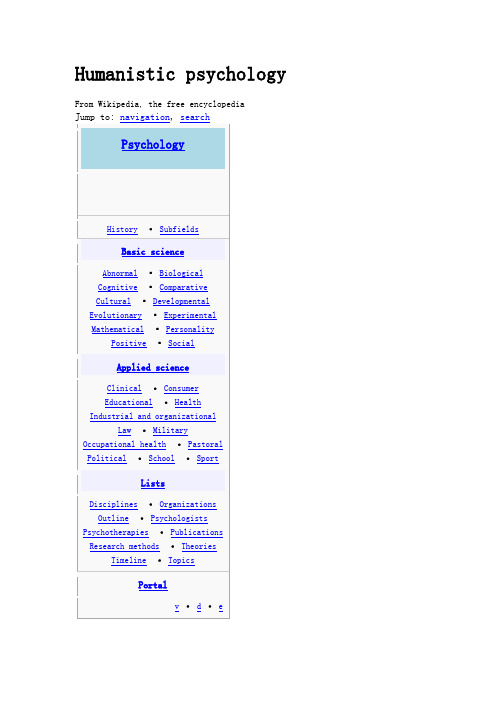
Humanistic psychology From Wikipedia, the free encyclopediaHumanistic psychology is a psychological perspective which rose to prominence in the mid-20th century, drawing on the work of early pioneers like Carl Rogers and the philosophies of existentialism and phenomenology. It adopts a holistic approach to human existence through investigations of meaning, values, freedom, tragedy, personal responsibility, human potential, spirituality, and self-actualization.[1][2]Contents[hide]∙ 1 Conceptual origins∙ 2 Development of the field∙ 3 Counseling and therapy∙ 4 Humanistic psychology and social issues∙ 5 Criticism∙ 6 See also∙7 References∙8 External links∙9 Further reading[edit] Conceptual originsThe humanistic approach has its roots in phenomenological and existentialist thought [3] (see Kierkegaard, Nietzsche, Heidegger, and Sartre). Eastern philosophy and psychology also play a central role in humanistic psychology, as each shares similar concerns about the nature of human existence and consciousness.[2]It is also sometimes understood within the context of the three different forces of psychology: behaviorism, psychoanalysis and humanism. Behaviorism grew out of Ivan Pavlov's work with the conditioned reflex, and laid the foundations for academic psychology in the United States associated with the names of John B. Watson and B.F. Skinner. This school was later called the science of behavior. Abraham Maslow later gave behaviorism the name "the second force". The "first force" came out of Freud's research of psychoanalysis, and the psychologies of Alfred Adler, Erik Erikson, Carl Jung, Erich Fromm, Karen Horney, Otto Rank, Melanie Klein, Harry Stack Sullivan, and others. These theorists and practitioners, although basing their observations on extensive clinical data, primarily focused on the depth or "unconscious" aspects of human existence [4]In the late 1950s, psychologists concerned with advancing a more holistic vision of psychology convened two meetings in Detroit, Michigan. These psychologists, including Abraham Maslow, Carl Rogers, and Clark Moustakas, were interested in founding a professional association dedicated to a psychology that focused on uniquely human issues, such as the self, self-actualization, health, hope, love, creativity, nature, being, becoming, individuality, and meaning—that is, a concrete understanding of human existence.[edit] Development of the fieldThese preliminary meetings eventually led to other developments, which culminated in the description of humanistic psychology as a recognizable "third force" in psychology (along with behaviorism and psychoanalysis). Significant developments included the formation of the Association for Humanistic Psychology (AHP) in 1961 and the launch of the Journal of Humanistic Psychology (originally "The Phoenix") in 1961.Subsequently, graduate programs in Humanistic Psychology at institutions of higher learning grew in number and enrollment. In 1971, humanistic psychology as a field was recognized by the American Psychological Association (APA) and granted its own division (Division 32) within the APA. Division 32 publishes its own academic journal called The Humanistic Psychologist.[2]The major theorists considered to have prepared the ground for Humanistic Psychology are Abraham Maslow, Carl Rogers and Rollo May. Maslow was heavily influenced by Kurt Goldstein during their years together at Brandeis University. Psychoanalytic writers also influenced humanistic psychology. Maslow himself famously acknowledged his "indebtedness to Freud" in Towards a Psychology of Being[5]Other psychoanalytic influences include the work of Wilhelm Reich, who discussed an essentially 'good', healthy core self and Character Analysis (1933), and Carl Gustav Jung's mythological and archetypal emphasis. Other noteworthy inspirations for and leaders of the movement include Roberto Assagioli, Gordon Allport, Medard Boss, Martin Buber (close to Jacob L. Moreno), James Bugental, Victor Frankl, Erich Fromm, Hans-Werner Gessmann, Amedeo Giorgi, Kurt Goldstein, Sidney Jourard, R. D. Laing, Clark Moustakas, Lewis Mumford, Fritz Perls, Anthony Sutich, Thomas Szasz, and Ken Wilber.[2][6]A human science view is not opposed to quantitative methods, but, following Edmund Husserl: 1) favors letting the methods be derived from the subject matter and not uncritically adopting the methods of natural science[7], and 2) advocates for methodological pluralism. Consequently,much of the subject matter of psychology lends itself to qualitative approaches (e.g., the lived experience of grief) , and quantitative methods are mainly appropriate when something can be counted without leveling the phenomena (e.g., the length of time spent crying).[edit] Counseling and therapyHumanistic psychology includes several approaches to counseling and therapy. Among the earliest approaches we find the developmental theory of Abraham Maslow, emphazising a hierarchy of needs and motivations; the existential psychology of Rollo May acknowledging human choice and the tragic aspects of human existence; and the person-centered orclient-centered therapy of Carl Rogers, which is centered on the clients' capacity for self-direction and understanding of his/her own development.[8]Other approaches to humanistic counseling and therapy include Gestalt therapy, humanistic psychotherapy, depth therapy, holistic health, encounter groups, sensitivity training, marital and family therapies, body work, and the existential psychotherapy of Medard Boss.[2] Existential-integrative psychotherapy, developed by Kirk Schneider (2008), is a relatively new development within humanistic and existential therapy.Self-help is also included in humanistic psychology: Sheila Ernst and Lucy Goodison have described using some of the main humanistic approaches in self-help groups.[9][citation needed]Co-counselling, which is a purely self-help approach, is regarded as coming within humanistic psychology (see John Rowan's Guide to Humanistic Psychology). Humanistic theory has had a strong influence on other forms of popular therapy, including Harvey Jackins' Re-evaluation Counselling and the work of Carl Rogers.Humanistic psychology tends to look beyond the medical model of psychology in order to open up a nonpathologizing view of the person.[8]This usually implies that the therapist downplays the pathological aspects of a person's life in favour of the healthy aspects. A key ingredient in this approach is the meeting between therapist and client and the possibilities for dialogue. The aim of much humanistic therapy is to help the client approach a stronger and more healthy sense of self, also calledself-actualization.[2][8] All this is part of humanistic psychology's motivation to be a science of human experience, focusing on the actual lived experience of persons.[2][edit] Humanistic psychology and social issuesAlthough social transformation may not have been the primary focus in the past, a large percentage of contemporary humanistic psychologists currently investigate pressing social, cultural, and gender issues [10]. Even the earliest writers who were associated with and inspired psychological humanism[2] explored topics as diverse as the political nature of "normal" and everyday experience (RD Laing), the disintegration of the capacity to love in modern consumerist society (Erich Fromm)[11], the growing technological dominance over human life (Medard Boss), and the question of evil (Rollo May-Carl Rogers debate). In addition, Maureen O’Hara, who worked with both Carl Rogers and Paolo Freire, has pointed to a convergence between the two thinkers given their distinct but mutually related focus on developing critical consciousness of situations which oppress and dehumanize.[12][edit] CriticismThe neutrality of this section is disputed. Please see thediscussion on the talk page. Please do not remove this messageuntil the dispute is resolved.(December 2010)Critics of the field point out that it tends to ignore social change research. Isaac Prilleltensky, a self-described radical who champions community and feminist psychology, has argued for years that humanistic psychology inadvertently contributes to systemic injustice.[13]Further, it has been argued that the early incarnations of humanistic psychology lacked a cumulative empirical base,[14] and the architects of the movement endorsed an "unembarrassed denial of human reciprocity and community."[15] However, according to contemporary humanistic thinkers, humanistic psychology need not be understood to promote such ideas as narcissism, egotism, or selfishness.[16]The association of humanistic discourse with narcissistic and overly optimistic worldviews is a misreading of humanistic theory. In their response to Seligman & Csikszentmihalyi(2000), Bohart and Greening (2001) note that along with pieces on self-actualization and individual fulfillment, humanistic psychologists have also published papers on a wide range of social issues and topics, such as the promotion of international peace and understanding, awareness of the holocaust, thereduction of violence, and the promotion of social welfare and justice for all.[16]Criticisms that humanistic psychology lacks an “empirical base” have tended to rely on allegedly "restricted views" of what constitutes “empirical,” an uncritical adoption of natural science methods (as opposed to human science methods), and an out right neglect of Rogers’ own empirical work [17]. To the contrary, humanistic psychology has a long history of empirical research [18], including but not limited to the work of Maslow, Amedeo Giorgi and David Elkins [19]. In fact, humanistic psychology research traces its origins all the way back to American psychology pioneer William James’masterpiece, “Varieties of Religious Experience”[18][edit] See also∙Saybrook University∙Institute of Transpersonal Psychology∙Personal development∙Organismic theory∙Phenomenology (psychology)[edit] References1.^"humanistic psychology n." A Dictionary of Psychology. Edited by AndrewM. Colman. Oxford University Press 2009. Oxford Reference Online. Oxford University Press. 25 May 2010 [1]2.^ a b c d e f g h Aanstoos, C. Serlin, I., & Greening, T. (2000). A Historyof Division 32 (Humanistic Psychology) of the American Psychological Association. In D. Dewsbury (Ed.), Unification through division:Histories of the divisions of the American Psychological Association, Vol. V. Washington, DC: American Psychological Association.3.^Humanistic Psychology, APA4.^ AHP History, About Humanistic Psychology5.^ Maslow, A. (1998).Towards a psychology of being, 3rd ed. New York:Wiley.6.^ Moss, D. (2001). The roots and geneaology of humanistic psychology.In K.J. Schneider, J.F.T. Bugental & J.F. Pierson (Eds.) The handbook of humanistic psychology: Leading edges in theory, research and practice (pp. 5-20). Thousand Oaks, CA: Sage Publications7.^Giorgi, Amedeo (2009). The descriptive phenomenological method inpsychology: A modified Husserlian approach. Pittsburgh, PA: DuquesneUniversity Press. ISBN 978-0-8207-0418-08.^ a b c Clay, Rebecca A. (September 2002). "A renaissance for humanisticpsychology. The field explores new niches while building on its past."American Psychological Association Monitor, 33(8).9.^Ernst, Sheila & Goodison, Lucy (1981). In our own hands: A book of selfhelp therapy. London: The Women's Press. ISBN 0-7043-3841-610.^ Hoffman, Louis, et al. (2009). Existential psychology East-West.Colorado Springs: University of the Rockies Press. ISBN978-0-8207-0418-011.^ Fromm, E. (1956).The art of loving. New York: Harper & Row.12.^ O'Hara, M. (1989). Person-centered a pproach as conscientização: Theworks of Carl Rogers and Paulo Freire. Journal of Humanistic Psychology, 29(1), 11-35. doi:10.1177/0022167889291002.13.^See Prilleltensky, Isaac (Autumn 1992). "Humanistic Psychology, HumanWelfare and the Social Order". The Journal of Mind and Behaviour 13 (4): 315–327.14.^ Seligman, Martin; Csikszentmihalyi, Mihaly (January 2000). "Positivepsychology: An introduction". American Psychologist 55 (1): 5–14.15.^ Marin, Peter (October 1975). "The New Narcissism". Harper's Magazine,45–56. /archive/1975/10/0022323.16.^ a b Bohart, Arthur C. & Greening, Thomas (January 2001). "Comment:Humanistic Psychology and Positive Psychology". American Psychologist, 56(1): 81–82.17.^Robbins, B. (2008). What is the Good Life: Positive psychology and therenaissance of humanistic psychology. The Humanistic Psychologist,36,96–11218.^ a b Wertz, F.J. (2001). Humanistic psychology and the qualitativeresearch tradition. In K.J. Schneider, J.F.T. Bugental & J.F. Pierson (Eds.) The handbook of humanistic psychology: Leading edges in theory, research and practice(pp. 231-246). Thousand Oaks, CA: Sage Publications19.^ Elkins, David (2009). Humanistic psychology: A clinical manifesto.Colorado Springs: University of the Rockies Press.[edit] External links∙Association for Humanistic Psychology∙Society for Humanistic Psychology, Division 32 of the American Psychological Association[edit] Further reading∙Bugental, J.F.T (1964). "The Third Force in Psychology". Journal of Humanistic Psychology 4 (1): 19–25.doi:10.1177/002216786400400102.∙Rowan, John (2001). Ordinary Ecstasy: The Dialectics of Humanistic Psychology (3rd ed.). Brunner-Routledge. ISBN 0-415-23633-9∙Schneider, K.J.; Bugental, J.F.T.; Pierson, J.F., eds (2001). The handbook of humanistic psychology : leading edges in theory,research, and practice. Thousand Oaks, CA: Sage Publications. ISBN 0-7619-2121-4∙Schneider, K.J., ed (2007). Existential-integrative Psychotherapy: Guideposts to the Core of Practice. New York: Routledge. ISBN978-0-415-95471-6Retrieved from "/wiki/Humanistic_psychology" Categories: Humanistic psychology | Psychological schools | ExistentialismHidden categories: All articles with unsourced statements| Articles with unsourced statements from September 2009 | NPOV disputes from December 2010 | All NPOV disputes | Use dmy dates from October 2010。
心理学专业英语
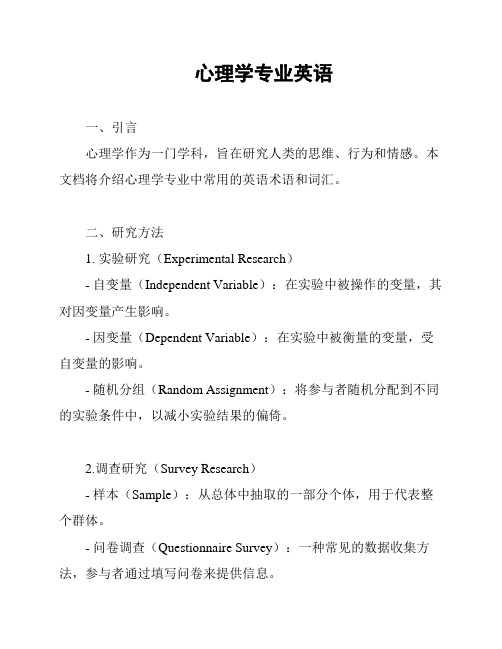
心理学专业英语一、引言心理学作为一门学科,旨在研究人类的思维、行为和情感。
本文档将介绍心理学专业中常用的英语术语和词汇。
二、研究方法1. 实验研究(Experimental Research)- 自变量(Independent Variable):在实验中被操作的变量,其对因变量产生影响。
- 因变量(Dependent Variable):在实验中被衡量的变量,受自变量的影响。
- 随机分组(Random Assignment):将参与者随机分配到不同的实验条件中,以减小实验结果的偏倚。
2.调查研究(Survey Research)- 样本(Sample):从总体中抽取的一部分个体,用于代表整个群体。
- 问卷调查(Questionnaire Survey):一种常见的数据收集方法,参与者通过填写问卷来提供信息。
三、主要理论1.行为主义(Behaviorism)- 刺激-反应(Stimulus-Response):行为主义认为,行为是对刺激的直接反应。
2.认知心理学(Cognitive Psychology)- 情绪(Emotion):主观体验和生理反应的一种状态,通常与特定刺激有关。
- 记忆(Memory):对于信息的编码、存储和检索能力。
- 研究(Learning):通过经验和实践获取知识和技能的过程。
四、发展领域1.临床心理学(Clinical Psychology)- 临床评估(Clinical Assessment):通过各种测试和观察手段,评估个体的心理状况。
- 治疗(Therapy):利用心理和行为干预手段,帮助个体解决心理困扰。
2.社会心理学(Social Psychology)- 社会认知(Social Cognition):研究个体如何感知、记忆和思考与他人相关的信息。
五、结论本文档提供了心理学专业常用英语术语和词汇的简要介绍,希望能帮助读者更好地理解和研究心理学领域的知识。
参考文献:- Smith, J. (2010). Introduction to Psychology. Publisher.- Johnson, L. (2015). Key Concepts in Cognitive Psychology. Publisher.。
p21心理学专业外语第21页
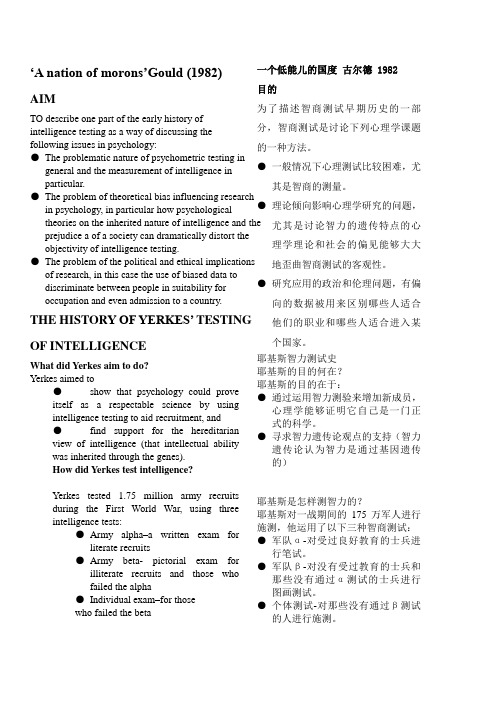
‘A nation of morons’Gould (1982)AIMTO describe one part of the early history ofintelligence testing as a way of discussing thefollowing issues in psychology: ● The problematic nature of psychometric testing ingeneral and the measurement of intelligence inparticular. ● The problem of theoretical bias influencing researchin psychology , in particular how psychologicaltheories on the inherited nature of intelligence and the prejudice a of a society can dramatically distort theobjectivity of intelligence testing.● The problem of the political and ethical implications of research, in this case the use of biased data todiscriminate between people in suitability foroccupation and even admission to a country . THE HISTOR Y OF YERKES’ TESTING OF INTELLIGENCEWhat did Y erkes aim to do? Y erkes aimed to● show that psychology could prove itself as a respectable science by using intelligence testing to aid recruitment, and ● find support for the hereditarian view of intelligence (that intellectual ability was inherited through the genes). How did Y erkes test intelligence?Y erkes tested 1.75 million army recruits during the First World War, using three intelligence tests:● Army alpha –a written exam for literate recruits● Army beta- pictorial exam for illiterate recruits and those who failed the alpha● Individual exam –for those who failed the beta一个低能儿的国度 古尔德 1982 目的为了描述智商测试早期历史的一部分,智商测试是讨论下列心理学课题的一种方法。
心理学专业英语总结(完整)
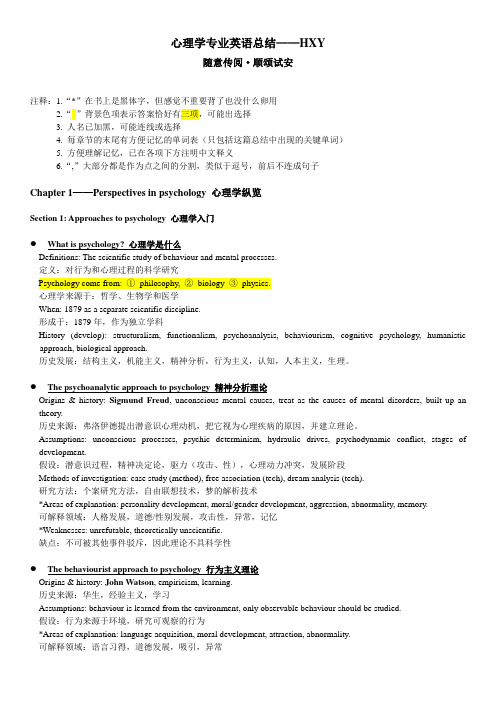
心理学专业英语总结——HXY随意传阅·顺颂试安注释:1.“*”在书上是黑体字,但感觉不重要背了也没什么卵用2.“”背景色项表示答案恰好有三项,可能出选择3. 人名已加黑,可能连线或选择4. 每章节的末尾有方便记忆的单词表(只包括这篇总结中出现的关键单词)5. 方便理解记忆,已在各项下方注明中文释义6.“,”大部分都是作为点之间的分割,类似于逗号,前后不连成句子Chapter 1——Perspectives in psychology 心理学纵览Section 1: Approaches to psychology 心理学入门●What is psychology? 心理学是什么Definitions: The scientific study of behaviour and mental processes.定义:对行为和心理过程的科学研究Psychology come from: ①philosophy, ②biology ③physics.心理学来源于:哲学、生物学和医学When: 1879 as a separate scientific discipline.形成于:1879年,作为独立学科History (develop): structuralism, functionalism, psychoanalysis, behaviourism, cognitive psychology, humanistic approach, biological approach.历史发展:结构主义,机能主义,精神分析,行为主义,认知,人本主义,生理。
●The psychoanalytic approach to psychology 精神分析理论Origins & history: Sigmund Freud, unconscious mental causes, treat as the causes of mental disorders, built up an theory.历史来源:弗洛伊德提出潜意识心理动机,把它视为心理疾病的原因,并建立理论。
Thehumanisticapproachtopersonality.ppt

Abraham Maslow
Initially sold on behaviorism Questioned when he read Freud Everything changed after the birth of his first child, he looked beyond both Decided that we spend too much time on the mentally ill to understand mental health Focus on the strong. Want to run fast? Don’t study cripples.
Carl Rogers 1902-1987
Conservative background Postconventional experiences at Madison A career blessed with success Continuous work as a therapist – 15 to 20 hrs/week for decades
fundamentals
We are rational – but we don’t always act that way We are aware, we know what we want We have a self-concept which filters our perceptions Everything is fine if our self-concept lines up with reality If not, trouble
Eleanor Roosevelt Gandhi Jefferson Lincoln
So few, changed from a destination to a path.
心理学专业外语翻译第12页
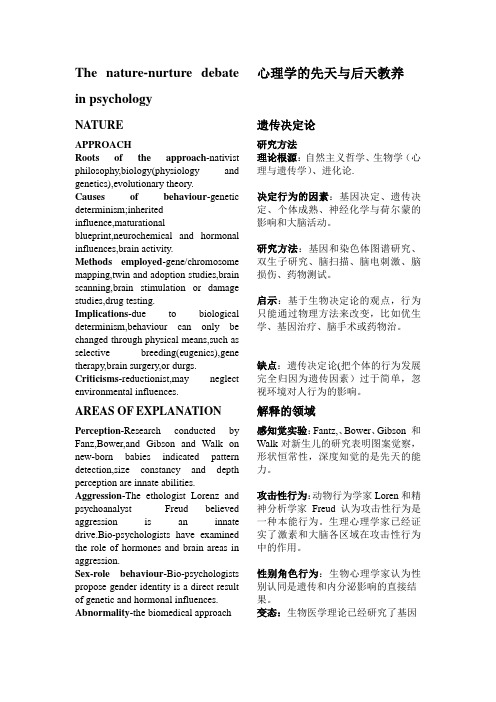
The nature-nurture debate in psychologyNATUREAPPROACHRoots of the approach-nativist philosophy,biology(physiology and genetics),evolutionary theory.Causes of behaviour-genetic determinism;inheritedinfluence,maturationalblueprint,neurochemical and hormonal influences,brain activity.Methods employed-gene/chromosome mapping,twin and adoption studies,brain scanning,brain stimulation or damage studies,drug testing.Implications-due to biological determinism,behaviour can only be changed through physical means,such as selective breeding(eugenics),gene therapy,brain surgery,or durgs. Criticisms-reductionist,may neglect environmental influences.AREAS OF EXPLANATION Perception-Research conducted by Fanz,Bower,and Gibson and Walk on new-born babies indicated pattern detection,size constancy and depth perception are innate abilities. Aggression-The ethologist Lorenz and psychoanalyst Freud believed aggression is an innate drive.Bio-psychologists have examined the role of hormones and brain areas in aggression.Sex-role behaviour-Bio-psychologists propose gender identity is a direct result of genetic and hormonal influences. Abnormality-the biomedical approach 心理学的先天与后天教养遗传决定论研究方法理论根源:自然主义哲学、生物学(心理与遗传学)、进化论.决定行为的因素:基因决定、遗传决定、个体成熟、神经化学与荷尔蒙的影响和大脑活动。
心理学专业外语

The biological approach to psychological matters has integrated with and run parallel to the rest of psychological thought since early Greek times-the Greek physician Galen suggested that personality and temperament may be linked to the levels of body fluids such as blood and bile in the body.
心理问题的生物学研究方法已经与自希腊早期以来的其余心理学 思想融合而且并行存在,希腊医生盖伦认为人的个性和气质可能 与体液水平相关联,如人体内的血液和胆汁的不同配合。
As knowledge of human anatomy, physiology, biochemistry, and medicine developed, important insights for human behaviour and experience were gained.
orientate:朝向;面向;定向 reside:住,居住;属于
生物学取向的心理学家假定: 所有心理的东西首先起源于生理的-这是因为,自从人类意识在 大脑中出现,所有的思维、情感和行为最终都可以归结为生理/ 生物学的原因。
human genes have evolved over millions of years to adapt behaviour to the environment. Therefore, much behaviour will have a genetic basis
心理学专业外语:Idiographic VS. nomothetic approaches to psychology
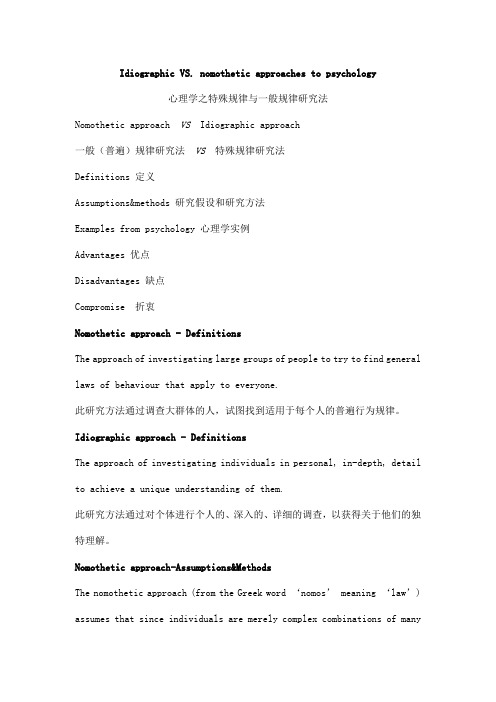
Idiographic VS. nomothetic approaches to psychology心理学之特殊规律与一般规律研究法Nomothetic approach VS Idiographic approach一般(普遍)规律研究法VS特殊规律研究法Definitions 定义Assumptions&methods 研究假设和研究方法Examples from psychology 心理学实例Advantages 优点Disadvantages 缺点Compromise 折衷Nomothetic approach - DefinitionsThe approach of investigating large groups of people to try to find general laws of behaviour that apply to everyone.此研究方法通过调查大群体的人,试图找到适用于每个人的普遍行为规律。
Idiographic approach - DefinitionsThe approach of investigating individuals in personal, in-depth, detail to achieve a unique understanding of them.此研究方法通过对个体进行个人的、深入的、详细的调查,以获得关于他们的独特理解。
Nomothetic approach-Assumptions&MethodsThe nomothetic approach (from the Greek word ‘nomos’ meaning ‘law’) assumes that since individuals are merely complex combinations of manyuniversal laws, people are best studied by large scale, preferably experimental, methods to identify those laws.一般规律研究法(源自希腊词汇‘nomos’,意思是‘规律’)假设,既然个体只是许多普遍规律的复杂结合体,那么在对人们进行研究时最好通过大规模的、更适宜的实验方法来证实这些规律。
- 1、下载文档前请自行甄别文档内容的完整性,平台不提供额外的编辑、内容补充、找答案等附加服务。
- 2、"仅部分预览"的文档,不可在线预览部分如存在完整性等问题,可反馈申请退款(可完整预览的文档不适用该条件!)。
- 3、如文档侵犯您的权益,请联系客服反馈,我们会尽快为您处理(人工客服工作时间:9:00-18:30)。
The humanistic approach to psychology心理学的人本主义研究方法‘Humanistic psychology has as its ultimate goal the preparation of a complete description of what it means to be alive as a human being’.Bugental(1967)“人本主义心理学把对人类活着意义的完整阐述作为其终极目标。
”布根塔尔(1967)Origins and history1.起源和历史The humanistic movement developed in America in the early 1960s,and was termed the third force in psychology since it aimed to replace the two main approaches in the subject at that time,behaviourism and psychoanalysis.Influenced by gestalt psychology’s idea of studying whole units, and existential philosophy with its belief in conscious free will,humanists argued that behaviourism’s artificial and dehumanising approach and psychoanalysis’s gloomy determinism were insufficient to provide a complete psychology.人本主义运动发展壮大于20世纪60年代初的美国,由于它旨在取代当时这一领域的两大心理学重要研究方法——行为主义和精神分析,而被称为心理学的第三势力。
受格式塔心理学研究整体的思想,以及存在主义哲学推崇有意识的自由意志的影响,人本主义者认为行为主义人造的和非人化的方法以及精神分析阴郁的决定论不足支撑完整的心理学。
The humanistic approach aimed to investigate all the uniquely human aspects of experience such as love,hope,creativity,etc.and emphasised the importance of the individual’s interaction with the environment.Humanists,such as Maslow,believed that every individual has the need to self-actualise or reach their potential,and Rogers developed client-centred therapy to help individuals in this process of self-actualisation.人本主义的研究方法旨在探讨人类独有的经验,例如,爱、希望、创造力等,并且强调个人与环境相互作用的重要性。
人本主义者,如马斯洛,相信每个人都有自我实现的或达到自己潜能的需要,罗杰斯创建的来访者中心疗法就是用来帮助个体在此过程中完成自我实现的。
Assumptions2.理论假设Bugental(1967),the first president of the American Association for Humanistic Psychology,described some of its fundamental assumptions: 美国人本主义心理学会第一届主席布根塔尔(1967)描述了一些基本假设:A proper understanding of human nature can only be gained from studying humans, not other animals.只有通过研究人类,而绝非其他的动物,才能获取对人性恰当的理解。
Psychology should research areas that are meaningful and important to human existence,not neglect them because they are too difficult. Psychology should be applied to enrich human life.心理学应当研究对人类的生存有意义且重要的领域,而不能因为困难而忽视它们。
心理学应当被用来丰富人类的生活。
Psychology should study internal experience as well as external behaviour and consider that individuals can show some degree of free will.心理学应当像研究外显行为一样研究内在经验,并且认为个体能够在一定程度上展现自由意志。
Psychology should study the individual case(an ididographic method) rather than the average performance of groups(a nomothetic approach). 心理学应当研究个案(一种独特的方法)而非团体的平均表现(一种常规的方法)。
In general, humanistic psychologists assume that the whole person should be studied in their environmental context.总之,人本主义心理学家认为对整个人的研究应当在他们的生活环境中进行。
Methods of investigation3.研究方法Humanists take a phenomenological approach, investigating the individual’s conscious experience of the world.For this reason they employ the idiographic case study method,and use a variety of individualistic techniques such as人本主义者运用现象学方法研究个体关于世界的有意识的经验。
由于这个原因,他们使用特殊规律个案研究法,并且使用多样的个体化技术,例如:flexible open ended interviews.灵活的开放式访谈。
The Q-sort technique,where the participant is given one hundred different statements on cards,such as ‘I don’t trust my emotions’ or ‘I have an attractive personality’ which they have to sort into piles for personal relevanceQ分类技术,在运用时,给与参与者具有一百个不同语句的卡片,例如:“我不信任我的情绪”,或者“我有一个吸引人的个性”。
他们要把这些语句按照与个性的相关进行分类。
Areas of explanation4.阐释内容The humanistic approach has been applied to relatively few areas of psychology compared to other approaches.The main areas of explanation have been in与其他方法相比较而言,人本主义的研究方法在心理学领域的应用非常有限。
最主要的阐释内容有:Personality/self identity,e.g.Rogers’s self theory人格同一性/自我认同,例如,罗杰斯的自我理论Motivation,e.g.Maslow’s hierarchy of needs and self-actualisation动机,例如,马斯洛的需要层次理论和自我实现Abnormality,e.g.due to imposed conditions of worth by others or the inability to accept the true self. Humanists are against the nomothetic classification of abnormality变态,例如,由于被他人强加的价值条件或无法接受真实的自我。
人本主义者反对对变态的常规分类。
Practical applications5.实际应用The humanistic approach’s primary application has been to therapeutic treatment for anybody suffering ’problems with living’. Some humanistic therapies include人本主义的研究方法主要用来治疗遭受生活困扰的人。
一些人本主义治疗方法包括:client-centred therapy-whereby the client is encouraged to develop positive self-regard and overcome mismatch between their perceived self,true self,and ideal self来访者中心疗法-鼓励来访者建立积极的自尊以及克服他们的知觉自我、真我(现实我)和理想我之间的不协调。
gestalt therapy-developed by Fritz Perls,the aim is to help the client become a ‘whole’(gestalt)person by getting them to accept every aspect of themselves格式塔疗法——由珀尔斯发展而来,它的目标是帮助来访者通过接受他们自己的每一方面从而成为一个“完整的”(格式塔)人。
